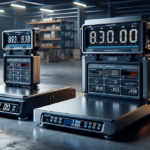Rice Lake RoughDeck vs Salter Brecknell PS1000: Comprehensive Comparison
When it comes to weighing applications, selecting the right equipment can significantly impact both accuracy and efficiency. Two models that frequently top the list are the Rice Lake RoughDeck and the Salter Brecknell PS1000. This article provides an in-depth comparison of these two options to help you make an informed decision for your weighing needs.
Overview of Rice Lake RoughDeck and Salter Brecknell PS1000
The Rice Lake RoughDeck and Salter Brecknell PS1000 are both industrial floor scales designed for heavy-duty weighing applications. Capable of measuring substantial loads, they are ideal for various industries such as manufacturing, agriculture, and logistics.
Both scales are renowned for their durability and ability to withstand harsh environments. Constructed with heavy-duty steel and featuring rugged designs, they can endure frequent use and exposure to dust, moisture, and other challenging elements. This reliability makes them a preferred choice for businesses requiring consistent and accurate weighing of heavy items daily.
Key Features Comparison
Load Capacity
Load capacity is a crucial factor when selecting a floor scale. The Rice Lake RoughDeck supports up to 20,000 pounds, making it suitable for very heavy loads across various industries. In contrast, the Salter Brecknell PS1000 has a maximum load capacity of 5,000 pounds, which may be sufficient for less demanding applications.
Accuracy
Accuracy is vital in weighing applications, as even slight discrepancies can affect operational efficiency and profitability. The Salter Brecknell PS1000 offers a superior accuracy rate of +/- 0.1%, compared to the RoughDeck's +/- 0.25%. This makes the PS1000 preferable for tasks where precise measurements are critical.
However, it's important to balance accuracy with load capacity based on your specific needs. While the PS1000 provides higher precision, the RoughDeck offers greater load capacity, which may be more important in certain industrial settings.
Platform Size
The platform size of a floor scale affects its suitability for different applications. The Rice Lake RoughDeck is available in multiple platform sizes, ranging from 4x4 feet to 8x10 feet, accommodating a wide variety of large items. Meanwhile, the Salter Brecknell PS1000 typically features a standard 4x4 feet platform, with additional sizes available upon request.
Choosing the right platform size depends on the dimensions of the items you need to weigh. Larger platforms provide more flexibility for oversized loads, while smaller platforms are sufficient for standard applications and save space.
Pros and Cons
Rice Lake RoughDeck
- Pros:
- Heavy-duty construction
- High load capacity
- Multiple platform size options
- Suitable for various industries
- Cons:
- Lower accuracy rate compared to Salter Brecknell PS1000
Salter Brecknell PS1000
- Pros:
- High accuracy rate
- Durable construction
- User-friendly interface
- Portability with rechargeable battery
- Cons:
- Lower load capacity compared to Rice Lake RoughDeck
- Limited platform size options
Industry Applications
Both scales are well-suited for industries that demand high load capacity and accuracy. Key sectors include:
- Manufacturing
- Agriculture
- Logistics
- Transportation
Additionally, the healthcare industry can benefit from these scales for tasks such as weighing patients and medical equipment. Accurate measurements are crucial for administering correct medication dosages and ensuring the proper handling of medical devices like wheelchairs and hospital beds. The durable construction of both scales ensures they can withstand the rigorous demands of healthcare settings.
User Reviews and Ratings
Rice Lake RoughDeck
Customers have rated the Rice Lake RoughDeck highly, particularly praising its durability and substantial load capacity. Users appreciate the variety of platform sizes, which allows them to select the most suitable option for their specific needs.
Additionally, many users highlight the ease of installation and maintenance. The straightforward design and clear instructions make it a popular choice for those seeking a reliable and low-maintenance weighing solution. The RoughDeck's compatibility with various indicators and accessories further enhances its versatility, catering to diverse operational requirements.
Salter Brecknell PS1000
The Salter Brecknell PS1000 has also received positive feedback from users, who commend its accuracy and durability. While some users note the lower load capacity, they value the high precision and overall quality of the scale.
Users appreciate the ease of use provided by the large digital display and intuitive controls, which simplify operation even for those unfamiliar with using scales. The compact size of the PS1000 is another favored feature, allowing it to be conveniently stored or relocated as needed. The rechargeable battery adds to its portability, although some users mention that battery life may be limited during extended use.
Maintenance Requirements
Rice Lake RoughDeck
To ensure the Rice Lake RoughDeck remains accurate and durable, regular maintenance is essential. Recommended maintenance tasks include:
- Regular cleaning to remove debris and contaminants
- Lubrication of moving parts to ensure smooth operation
- Periodic calibration checks to maintain measurement accuracy
Following these maintenance practices will extend the lifespan of the RoughDeck and ensure consistent performance.
Salter Brecknell PS1000
Maintenance for the Salter Brecknell PS1000 is similar to that of the RoughDeck and involves:
- Regular cleaning to prevent buildup of dust and debris
- Lubrication of any movable components
- Routine calibration to maintain high accuracy
Adhering to these maintenance guidelines will help sustain the PS1000’s reliability and precision over time.
Conclusion: Which Scale is Right for Your Needs?
Selecting between the Rice Lake RoughDeck and the Salter Brecknell PS1000 ultimately depends on your specific needs and priorities. If load capacity is your primary concern, the RoughDeck is the superior choice with its ability to handle up to 20,000 pounds. On the other hand, if accuracy is paramount, the PS1000’s +/- 0.1% precision makes it the better option.
Both scales are built to last and can endure frequent use, making them valuable investments for various industries. Consider factors such as load requirements, accuracy needs, platform size, and maintenance capabilities when making your decision. By evaluating these aspects, you can choose the scale that best aligns with your operational demands and ensures optimal performance.
For more detailed specifications and purchasing options, visit ShipScience.






















